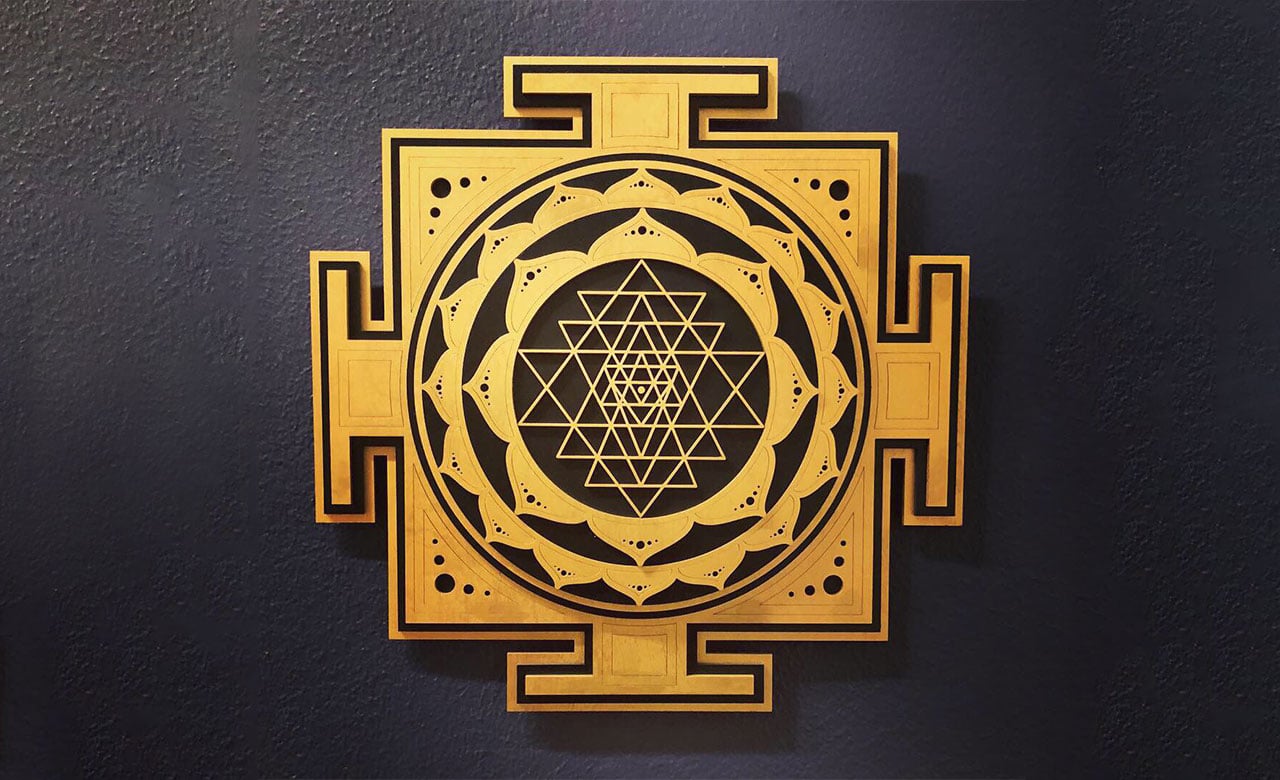
Spirituality
Shree Yantra – Meaning and Benefits
In Sanskrit, the word Yantra comes from the root word Yam which means instrument and or support and Tra which is derived from Trana which means release from bondage. Therefore, a Yantra is an instrument or tool that helps one with spiritual and material liberation.
Swami Ji defines Yantras as powerhouses of energy. All deities, Gods and Goddesses are full of divine cosmic energy and this energy is concentrated and stored in an instrument which is a Yantra.
There are various types of Yantras and we have mentioned a few of them in this blog . One of the most powerful of the Yantras, however, is Shree Yantra or the Yantra of Goddess Lakshmi.
In this blog, we understand the meaning of Shree Yantra and its importance in bringing us wealth, health, spiritual prowess and ultimately liberation.
Shree Yantra Meaning –
Also called the ‘Queen of Yantras’ or RajaYantra, the Shree Yantra is the symbol of the great divine mother principle, the source of all energy, power and creation. The design of the Shree Yantra is regarded as the design of the Universe as well as the body of Maha Lakshmi related to the feminine principle of Shakti or energy. Each line, triangle and lotus petal symbolize a specific type of Shakti.
The outer square of the Shree Yantra represents the Earth Element. In Vedic Sacred Geometry, the square corresponds to the Earth. The outside square represents mundane emotions such as anger, fear, lust, greed, pride and worldly desires. Sadhaks meditate on the outer square to rise above the negativity and distractions. The T-shape structures in the square are considered the gates of the four directions, and the entry points of the yantra.
The three circles come next which represent the past, present and future. Inside is the first ring with sixteen lotus petals that represent complete fulfilment of all hopes and desires. Going deeper, the petals stand for the ten organs or perception and touch – tongue, nose, mouth, skin, eyes, ears, feet, hands, arms, and the reproductive organs. Then come the five elements – earth, air, water, fire and space. Lastly, the sixteenth petal stands for the mind, which gathers and interprets information from the perceptions of the interactivity of the elements.
Next is an eight-petal lotus. Each petal governs a specific activity: speech, grasping, motion, excretion, enjoyment, revulsion, attraction, and equanimity. Within the inner lotus is the first set of interlocked triangles. Those that point upward represent the masculine principle, downward represent the feminine. These triangles also represent qualities and Shaktis.
Starting at the lowermost outer triangle and moving in a counterclockwise circle, they are agitation, pursuit, attraction, delight, delusion, immobility, release, control, pleasure, intoxication, an accomplishment of desire, luxury, mantra, and the destruction of duality.
The next circle has the same sequence and direction, starting from the lowest triangle and moving counterclockwise. The first triangle is the giver of all accomplishments. Next is the giver of wealth. The third is the energy of activities that please all. Fourth is the bringer of all blessings. The fifth is the granter of all desires. Next is the remover of all suffering. The seventh is considered the appeaser of death. Eighth is the overcomer of all obstacles. Ninth is the bringer of beauty, and the tenth is the giver of all good fortune.
The ten smaller triangles in the third circle represent, beginning at the same, lowermost triangle and moving counterclockwise: omniscience, omnipotence, sovereignty, knowledge, destruction of all disease, unconditional support, vanquishment of all evils, protection, and the attainment of all desires. The fourth circle of triangles, again starting at the same point and moving counterclockwise, represent: sustaining, creating, dissolution, pleasure, pain, cold, heat, and the ability to choose action.
In the final inner space, the Sadhak visualizes five arrows representing the world of the senses, a bow, representing the mind, a noose, representing attachment, and a stick, representing aversion. The central triangle is the giver of all perfection. In the middle of the central triangle is a Bindu, representing pure consciousness and the original state of being.
Once the Sadhak has reached this point, there is no going back. Only pure bliss and compassion exist here and the Sadhak attains enlightenment.
Now that we have understood the meaning of the Shree Yantra, it’s easier to understand the benefits we get by establishing it in our homes and performing its Sadhana and worship.
Shree Yantra Benefits –
It supercharges your self-awareness and illuminates a clear path to your inner self.
It empowers your inner self with the clarity to understand, explore, and spark massive change in the outside world.
It switches on your dormant “superpowers” to turn your deepest, most ambitious desires into reality.
It opens your eyes (and heart) to the people and wisdom that will rocket you towards your desires.
It turns you into an unstoppable magnet for attracting those people and wisdom into your reality.
It renders you invincible against internal and external setbacks holding you back from your destiny.
It flushes out the negative energy and blocks that silently sabotage your every step.
It unshackles you from the confines of your current reality, so you are free to begin accomplishing the “impossible”.
It nourishes you with the clarity, knowledge & joy to create anything you want, whenever you want – thus completing your transformation into an unstoppable Reality Hacker.
It brings in overall bliss, prosperity and wisdom in your life as well as your surroundings, your family and your neighborhood.
We hope this blog helped you understand the meaning and benefits of Shree Yantra. In order to establish one at your place and learn its Sadhana, write to us at info@chamundaswamiji.com
Post a Comment
-
Subscribe to Our Blog
-
Categories
-
Popular Articles
- Dead moth in the house. What universe is trying to tell you?
- Spiritual Meaning of Moth
- Vivah Bandhan Curse – What Is It and How to Spiritually Heal It.
- The Dasa Mahavidyas
- What are Beej Mantras?
- Tripura Sundari | The Dasa Mahavidya
- Maa Bhuvaneshwari | The Dasa Mahavidyas
- The Five Shades of Tantra
- Ramakrishna Paramhansa – The Man who almost became a Woman
- Maa Chinnamasta | The Dasa Mahavidyas



